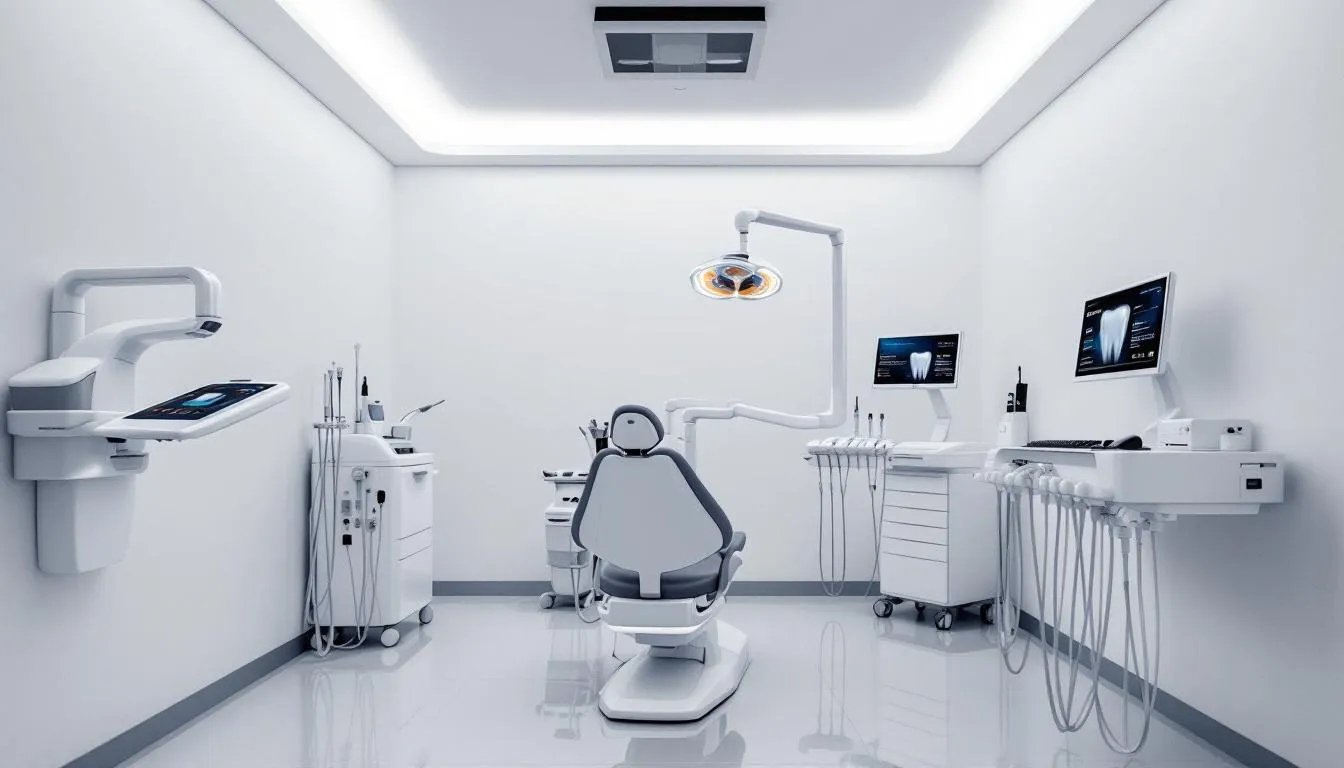What is Dental Equipment Financing?
Financing dental equipment involves obtaining equipment with business credit. The equipment is delivered and installed, and you pay for it in fixed monthly payments.
Many dental practices recognize the high cost of dental equipment as a significant reason for their inability to update their equipment. Equipment financing helps overcome these challenges.
Several financing options are available for dental equipment. Let’s review what’s available for your dental practice.
Equipment Loans
With an equipment loan, you purchase dental equipment with financing. The primary difference between an equipment loan and a regular loan is that the equipment serves as collateral. If the borrower defaults, the lender repossesses the equipment.
Dental equipment loans are considered self-collateralized. You might be familiar with other self-collateralized loans, such as car loans or mortgages. You usually won’t need a personal guarantee or other collateral.
Using the equipment as collateral reduces lenders‘ risk, leading to more significant borrowing amounts, lower and more competitive rates, and longer repayment terms.
Business equipment loan features:
-
Up to $5 million per piece of equipment.
-
Interest rates start at 3.5%.
-
Loan terms are between 1 and 6 years.
-
Funding in 3-10 business days.
Dental Equipment Leasing
Leasing dental equipment is a long-term rental. You pay to use the equipment in monthly lease payments. The leasing company provides the equipment, but it retains ownership of it.
At the end of the lease term, the equipment returns to the owner. Some companies will allow you to purchase the equipment at fair market value. Leasing dental equipment makes sense if you plan to use it for only a few years or believe it will become obsolete soon.
Other Small Business Loans
Several small business loans could benefit your dental practice. You can use most of the financial solutions listed below to purchase equipment or fund other areas of your dental business. Some lenders provide funding within 24 hours post-approval for dental practice loans.
For example, a business line of credit may not cover equipment costs, but it can help with everyday expenses and improve cash flow. Dentists and dental practices might be interested in the following:
How do Dental Equipment Loans work?
Dental equipment loans are a type of dental practice financing that specifically aims to enhance the dental practice’s equipment. You receive funding for a set amount to purchase equipment, then repay the principal and interest in fixed monthly payments over the loan term.
The first step is finding the equipment. Select your preferred equipment vendor and get an invoice. Next, find a lending partner. You want to work with a lender or marketplace that offers transparency and excellent service.
Once you have the equipment invoice, apply for the loan. Lenders evaluate the financial stability of a dental practice before extending a loan offer.
If approved, the lender sends the money to the vendor to pay the equipment invoice. The lender holds a lien on the equipment.
The vendor then sends and installs your dental equipment, allowing you to use it immediately. After you finish paying off the loan, you own it outright. The lender releases their lien and sends you the title.
Let’s review lending options.
Traditional Banks
Many traditional lenders provide financing for dental offices. Commercial banks, such as Wells Fargo, typically offer the lowest interest rates, but there are a few drawbacks.
Commercial banks have rigid qualifications. You typically need an excellent credit score, strong business financials, and at least two years of business experience. Many dentists struggle with credit scores due to student loan debt from dental school.
Traditional business loans may also require a substantial down payment. The other drawback is funding time. It could take weeks to fund your dental equipment loan.
Alternative Lenders & Lending Marketplaces
Online lenders and marketplaces, such as United Capital Source, offer dental practices more financing options than traditional banks. Most offer lower credit requirements and faster funding than conventional lending institutions.
When working with a non-bank lender, it’s essential to ensure they are trustworthy. Look for good customer reviews and a solid online reputation. Alternative funding sources typically have a fast approval process.
Dental Equipment Leasing Companies
There are several options when leasing dental equipment. Some dental equipment vendors offer leasing programs. When selecting a dental equipment leasing company, consider one that specializes in the dental industry.
How do you qualify for Dental Equipment Financing?
Each lender or marketplace has its own specific qualifications. When you apply for an equipment loan with United Capital Source, you will need the following:
-
A minimum credit score of 600.
-
At least 1 year in business.
-
Annual revenue of $250k+.
How to apply for an Equipment Loan:
Follow these steps to apply for dental equipment financing through United Capital Source.
Step 1: Ensure that buying equipment is the right choice for your dental practice.
You want to make sure the equipment is worth the cost of the loan. Some key considerations include the projected lifetime value of the new equipment and its ability to handle the job effectively.
Step 2: Gather your documentation.
You need to provide the following:
-
Driver’s license
-
The invoice for the dental equipment
-
Voided check
-
Bank statements
-
Financial statements.
Step 3: Complete the application
The application process is relatively fast. Apply directly through our one-page application or reach out to one of our loan experts.
Step 4: Speak to a representative.
After we receive your online application, a senior account executive will reach out to you. The account executive will discuss your needs and focus on providing you with dental loan offers. We offer complete transparency, with no hidden fees or surprises.
You’ll get a complete breakdown of loan amounts, terms, and fees. Once you have all the information, you can decide which options make the most sense for your dental practice.
Step 5: Get approved.
Your loan goes through when your application meets underwriting requirements and gets credit approval. Next, the funds are transferred directly to the seller to cover the invoice. We can help you set up automatic payments, or you can arrange to pay by check or electronic payment.
What are the benefits of Dental Equipment Financing?
Investments in dental equipment and technology enhance revenue and increase patient satisfaction. Implementing new equipment can lead to the practice of more modern dentistry. Section 179 tax deductions can make upgrading dental equipment more affordable. A dedicated support team is available to assist throughout the dental loan application process.
Dental practice loans can cover a range of expenses necessary for running a dental practice, including marketing and equipment. In addition to these advantages, financing helps preserve cash flow by allowing dentists to acquire high-cost equipment without using up working capital. It also enables faster growth by providing access to the latest tools that can reduce procedure times and expand service offerings.
Financing options often come with flexible repayment terms that can be structured to align with the practice’s revenue cycle. By consistently making payments, dental practices can also build their business credit. Furthermore, financing allows dentists to invest in higher-quality, advanced equipment that may be financially out of reach if purchased outright.
What are the drawbacks of Dental Equipment Financing?
Despite its numerous advantages, dental equipment financing also has potential drawbacks. One of the most common concerns is the added cost from interest, which can make the equipment more expensive over time. Taking on a loan or lease introduces new debt obligations, which could strain cash flow if the practice experiences inconsistent revenue.
Another consideration is the risk of equipment becoming outdated before the financing term ends, particularly given the rapid evolution of dental technology. While some lenders offer flexible qualification criteria, others may require strong credit scores, minimum time in business, or specific revenue thresholds. Leasing agreements, in particular, can sometimes include restrictive terms such as usage limits or mileage caps, and they do not provide ownership unless a purchase option is included at the end of the lease. Some lenders charge origination fees.
Dental Equipment Financing Pros & Cons
Pros:
-
Enhances patient satisfaction and practice revenue
-
Makes modern dental technology more accessible
-
Offers potential Section 179 tax deductions
-
Preserves cash flow for other business needs
-
Enables faster growth and service expansion
-
Flexible repayment terms & competitive interest rates based on cash flow
-
Helps build business credit with timely payments
-
Allows access to high-quality equipment without upfront costs
Cons:
-
It may cost more over time due to interest
-
Adds to monthly debt obligations
-
Risk of paying for outdated equipment
-
Some lenders have strict qualification requirements
-
Leases may come with usage restrictions and no ownership
-
Can impact cash flow if revenue is inconsistent
Frequently Asked Questions
Here are some of the most common questions about financing equipment for your dental practice.
What kinds of Dental Equipment can I finance?
One of the great benefits of equipment loans is that they can finance a wide range of dental equipment. With borrowing amounts up to $5 million per piece of equipment, you can acquire almost anything with a genuine business need.
Examples include:
-
X-Ray equipment
-
Dental chairs
-
Dental operatory lights
-
Equipment cabinets
-
Dental lasers
-
Surgical microscopes
-
Computers & dental software
-
Office equipment & furniture
-
Endodontic equipment
Is it better to finance or Lease Dental Equipment?
Deciding between leasing and taking out a loan comes down to your specific needs. For pieces with a long lifetime value, loans make more sense. Leasing makes more sense for equipment that is becoming obsolete with new technology.
There is also your budget to consider. Leasing payments are typically lower than loan payments. However, you could end up paying more by the end of the lease, and you won’t own the equipment. New dental practices or those with lower credit scores might find it more accessible to qualify for a lease more accessible than for a loan. Carefully consider the dental equipment financing terms before making a decision.
Can I Finance Dental Equipment with bad credit?
Since equipment loans are self-collateralized, lenders are more willing to work with borrowers who have poor credit. While you may be able to get a business loan with bad credit, you will likely have a higher interest rate.
Before applying, consider taking action to improve your business credit score. Third-party lenders may have other underwriting guidelines. Dentists may need to pledge additional collateral or a personal guarantee to secure a loan due to poor credit.
Dental Equipment Financing: Final Thoughts
Today’s dental patients want to feel comfortable with minimal pain. The latest technology helps dental offices deliver these expectations, but the costs run high.
Various dental equipment financing solutions could help your dental office meet equipment needs. When selecting a financing partner, look for one that understands the dental industry and your specific funding needs.
At United Capital Source, our team has experience securing equipment for dentists’ offices. We offer complete transparency. Please apply for equipment financing online or call us to discuss your options with one of our funding experts.













